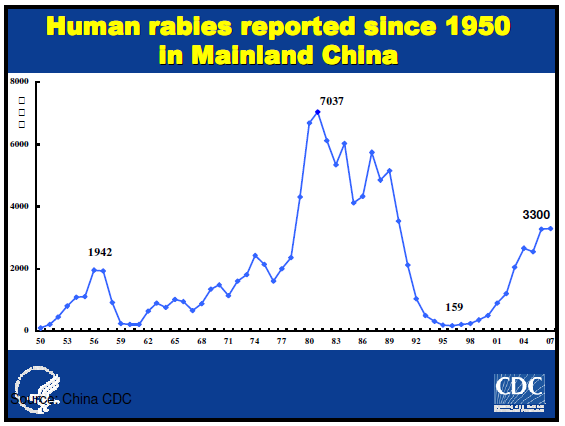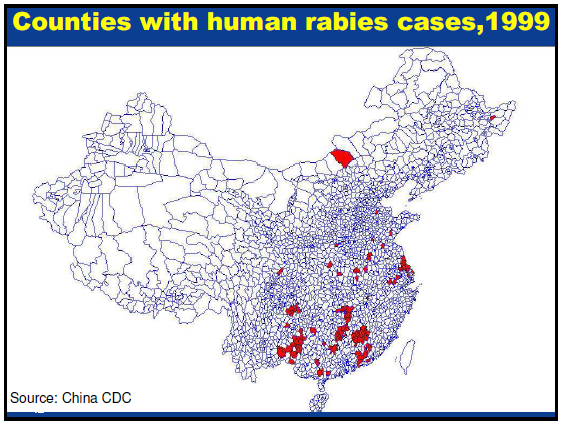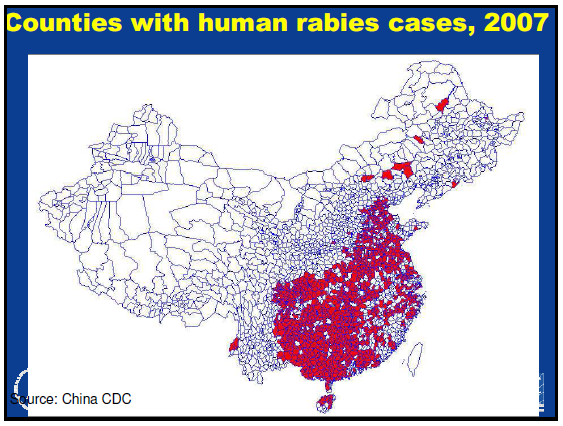A leaked Powerpoint presentation from wikileaks, showing that wikileaks is doing exactly what it should be doing: providing the raw information for good public health reporting, public health reporting that causes those in power to be asked a lot of difficult questions, so that things get fixed. In this case the information is the dramatic rise in human rabies cases in China from 1996 (159 cases) to 2007 (3,300 cases). It is sad to see China backslide, going so far backwards. That’s why now, more than ever, China needs democracy.
The title of this post is the note the uploader of the leaked document added when she/he uploaded the file to wikileaks.
But, question, where is the public health reporting on this issue? I understand it won’t happen in China, with their rather constrained press, but why not in Taiwan or Singapore?



I dont see why a democraticly elected “dictator for x years” has a bigger interest in preventing an epidemic and informing the people (of ways to prevent it), than the current one party regime?
following my first two tries at a comment:
hmmm… insufficient disease control and preventive health care (information) are not a reason for or against democracy… so you probably mean the lack of official information and reporting of important (government critical) issues. But this can also be achieved by a one party rule and the ccp leaders do have a big interest in satisfying the people
my counter: the CCP and local governments have a strong interest in preventing disease epidemics. because china doesnt have the curse of resources and if those in power want money, they have to tax a productive workforce.
Gani:
There are two reasons why democracies will prove better at addressing epidemics than authoritarian regimes.
1. Accountability: a democratically elected leader will be asked difficult questions and will be held accountable. Amartya Sen (nobel prize winning economist) has established the link between famine prevention and democratic governments in his book Development as Freedom. It is important to note that both a democratic multiparty government and a functioning free press are required for this mechanism to work. I should have mentioned that in my original post, but here are some posts where this is discussed:
2. Information Flows: If there exists a free press, i.e. information flows are not controlled by a central authority, information about epidemics will be made available. Individuals can and will act, even if no action whatsoever is taken by the central authority:
You are right that just because a particular leader may have been elected does not in and of itself mean that that leader will be better able to act to prevent an epidemic, but democracy must be seen as a system, encompassing both limits on that individual’s power and increases in that leaders moral connectivity, which are both key advantages to the democratic system.
With regards to the lack of information flows in centrally planned economies I would refer you to this quote from Mao Ze Dong, who here laments the failure to prevent the Chinese famine that raged on for three years in 1958-61. Mao Zedong noted the absence of a critical apparatus through local democracy:
The above quote of Mao Zedong comes from:
Sen, Amartya, & Dreze, J.H., Hunger & Public Action, Oxford, Clarendon Press 1989, page 213.
thanks for the extensive reply. I dont think I got a email notification so I am lucky to have left the tab in my browser open.
I am really surprised that mao actually “said or wrote” the above quote, but I guess every leader of a nation or corporation at least had those thoughts.
Though I doubt that presi Bush has been better informed about his country and the world then the current chinese leadership. (but i dont want to discuss this point)
In this case the data (in the above pictures) seems to have been collected by a colaboration of chinese and usamerican government institutinion. So… the data has been collected and is probably in the hands of the institution responsible for health and disease control. And they have every interest in not having to answer the party leadership for a big preventable disease outbreak. And such a preventable outbreak would undermine the current governements legitimation.
But I guess we both dont know enough about human rabies or the reaction of the responsible institution to … discuss this further.
and just like it would be nice to know what the trillion of dollars recently spent by the us governement have been used on (us american yet are not given the info) it would be nice for all officially collected information to made publicly available, also in china… guess we agree on that.
… it is just my assessment of the current chinese people connected by internet and cellphones and the public and private media that such a big “missinformation” of the public and party leadership cannot happen again.
(one reason why I am optimistic for the world as a whole, there are less and less places not reachable by modern telecommunication and even the poorest of the poorest will soon have a access to a cellphone and the internet in “nearly” every part of the world)
since I doubt i will find the book in any library of our city, can you give some more information on mao zedongs “note” on governing? like when, where, and whom he said it to… off course only if you have the book at hands.
In this case the data (in the above pictures) seems to have been collected by a colaboration of chinese and usamerican government institutinion. So… the data has been collected and is probably in the hands of the institution responsible for health and disease control. And they have every interest in not having to answer the party leadership for a big preventable disease outbreak. And such a preventable outbreak would undermine the current governements legitimation.
But the history has shown a different lesson–that when information is hidden it is not acted upon, to the extent it would be if it were not hidden. So the fact that some government authority has the information means very little–this can be seen from the fact that the increase in human rabies started about ten years ago, the uptick is visible in 1998, and the trend seven years ago, in 2002 is easy to spot.
Note that in USA you can see the Morbidity and Mortality Weekly Report right here:
http://www.cdc.gov/mmwr/preview/mmwrhtml/mm5752md.htm
The Chinese CDC, much to their credit, and I must admit, to my surprise, does now have that information available on their website:
http://www.chinacdc.net.cn/n272562/n276018/28760.html
The difference is though, the USA does put that number in historical context, where as you would have to do a little more digging to figure out the trend on the Chinese site. It is interesting that the site now lists the reportable diseases; when I’d looked a couple of years ago it hadn’t, (or perhaps I couldn’t find it)
However, even with the raw information, there isn’t the public pressure, acting through the press that makes the situation change (yet) See Mao’s quote above.
Mao’s quote was from 1962, it was at a party congress of some kind, the 7,000 in attendance were all, of course, loyal party members.
The quote is repeated also in Amartya Sen’s book Development as Freedom.
thanks… i have nothing specific to add. I’ll browse through and follow your blog for a while before Ill consider burdening you with a “why we shouldnt pressure china to become a democracy but rather request and observe that the reforms to universal healtcare (or any other kind of healt care for everyone) and social insurance or a basic income are real and good”
offcourse including the usual “usa and india and pakistan and… are democracy’s but”
you made a good statement with “You are right that just because a particular leader may have been elected does not in and of itself mean that that leader will be better able to act to prevent an epidemic, but democracy must be seen as a system, emcompassing both limits on that individuals power and increases in that leaders moral connectivity, which are both key advantages to the democratic system.”
… but the usa is not a very good example of that actually working…
… hmmm… ok… if you should want to lead a discussion on any of that (with me) a new blog entry would be… a good notification.
… forget it… I am more a blog and discussion reader then participant… … … thinking much not writing anything…